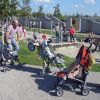Building a Europe of opportunity
How Germany helps young people and migrants enter the labour market with support from the European Social Fund (ESF).

Nearly 4,000 kilometres separate Olga Grund from Yuzhnouralsk, the small Russian town where she grew up, and Hamburg, the North German metropolis where she has lived since April 2013 – and is most at home. The 27-year-old places great emphasis on that. Olga Grund settled in quickly in Hamburg. That is because of her German husband and also because of the life she has built for herself here. “I consider it very important to have a job. For that you should be proficient in the German language,” she says emphatically.
That is why soon after arriving in Hamburg Olga Grund took language courses to improve her German. In a German course, however, you do not learn things like how to write an application or a curriculm vitae, what you need to consider when looking for an employer and which other formalities there are. So she registered with a project called Make it in Hamburg!, which is run by the German Gesellschaft für Internationale Zusammenarbeit (GIZ) and Arbeit und Leben, an educational institution based in Hamburg. The initiative supports the integration of foreign specialists with application coaching, intercultural workshops and information on training opportunities, assists them in looking for jobs or internships and, if necessary, provides support for accompanying spouses. German companies can also turn to project staff for help in finding qualified personnel. Make it in Hamburg! is financed by funds from the Free and Hanseatic City of Hamburg and the European Social Fund (ESF).
The ESF has a long tradition – the rules for this structural fund were already laid down in the 1957 Treaty of Rome. Since then the European partners have adjusted the orientation of this important funding instrument several times in line with changes in social and economic circumstances, but its core concern has remained the same: supporting people in their own endeavour to improve their chances on the labour market. In practice this can involve very different forms of activity.
Another example of an initiative that receives funding is MobiPro. This programme supports the career mobility of young people from EU countries who would like to undertake workplace-based vocational training or work in their skilled occupation in Germany. The integration of migrants is also improved in language courses. A programme called Xenos – Integration und Vielfalt aims to work against exclusion and discrimination in administration, vocational training, education and skills development. Xenox helps disadvantaged juveniles and young adults with and without immigrant backgrounds to (re-)integrate into the labour market and society. Support is also given to general measures for successful integration like the one from which Olga Grund benefited. As a young woman she belongs to one of the ESF’s main target groups. Improving the chances of the younger generation and increasing women’s employment are major concerns of the structural fund. In addition, the ESF aims to reduce long-term unemployment and increase further education. Support is not provided for individuals, but for programmes offered, for example, by public administrations or non-governmental organisations.
Almost 12.6 billion euros will be made available for the various ESF employment and integration programmes in Germany between 2014 and 2020. Of this total, some 7.5 billion euros will come from the ESF, the remaining sum being contributed by Germany in the form of co-funding. The Federal Government and the German states participate through their own respective programmes that directly improve many people’s future prospects. For example, one new Federal Government programme – it is called Zusammen. Zukunft. Gestalten. – aims to provide assistance to some 100,000 young people at the start of their working lives. Around 73,000 long-term unemployed will receive support for their return to work, and 150,000 migrants will be given initial support in the form of language courses and advice.
In addition to the responsible Federal Ministry of Labour and Social Affairs, the Federal Government’s ESF programme includes participation from the Federal Ministry of Education and Research, the Federal Ministry for Economic Affairs and Energy, the Federal Ministry of Family Affairs, Senior Citizens, Women and Youth and the Federal Ministry for the Environment, Nature Conservation, Building and Nuclear Safety.
Olga Grund is pleased that she soon found an internship with a German company. The logistics firm is also active in Russia and is involving its intern in contractual matters. As a result, her work will also enable her to maintain ties with her old home. Nevertheless, the 27-year-old has successfully moved the centre of her life to North Germany – also thanks to the help she received from the Make it in Hamburg! initiative. ▪

